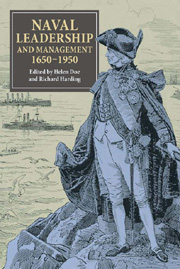Book contents
- Frontmatter
- Contents
- List of Tables
- List of Editors and Contributors
- Acknowledgements
- List of Abbreviations
- Michael Duffy: An Appreciation
- Introduction
- Leadership: The Place of the Hero
- 1 Admiral Rainier's Management Challenges, 1794–1805
- 2 Neglect or Treason: Leadership Failure in the Mid-Eighteenth-Century Royal Navy
- Leadership and Organisational Frictions: Contested Territories
- Management Capability and the Exercise of Naval Power
- The Evolution of Management Training in the Royal Navy, 1800–1950
- Select Bibliography
- Index
2 - Neglect or Treason: Leadership Failure in the Mid-Eighteenth-Century Royal Navy
from Leadership: The Place of the Hero
Published online by Cambridge University Press: 05 February 2013
- Frontmatter
- Contents
- List of Tables
- List of Editors and Contributors
- Acknowledgements
- List of Abbreviations
- Michael Duffy: An Appreciation
- Introduction
- Leadership: The Place of the Hero
- 1 Admiral Rainier's Management Challenges, 1794–1805
- 2 Neglect or Treason: Leadership Failure in the Mid-Eighteenth-Century Royal Navy
- Leadership and Organisational Frictions: Contested Territories
- Management Capability and the Exercise of Naval Power
- The Evolution of Management Training in the Royal Navy, 1800–1950
- Select Bibliography
- Index
Summary
The traditional history of the Royal Navy is a history of heroes. Long before the emergence of professional naval history, the purpose of the past was, explicitly, to instruct the present in preferred modes on conduct. From Jesuit education to classical education, the story of great deeds provided the content, narrative structure and purpose of history. With the emergence of modern history schools in the last quarter of the nineteenth century, the central role of hero retained its hold on naval and military history. For most of the time since, the idea of leadership has been associated with the heroic central character, whose personality and capability is the determining factor in a critical situation. This is not surprising given the dominating purpose of this history in the education of the officer corps.
Even today, the heroic leader remains a powerful element within historical studies. While behaviour to be emulated is more contested today, the hero, or central character, remains a focus around which the world of the past can be understood and brought to a human scale. Whether in literature, biography or history (actual or counter-factual), personality, good or evil, engages the reader more easily than long past impersonal ‘systems’. The power of Horatio Nelson, two hundred years after his death, to generate books, documentaries, dramas, societies and, ultimately, international commemoration, is testimony to the influence of heroes in the modern world.
- Type
- Chapter
- Information
- Naval Leadership and Management, 1650–1950 , pp. 43 - 58Publisher: Boydell & BrewerPrint publication year: 2012



